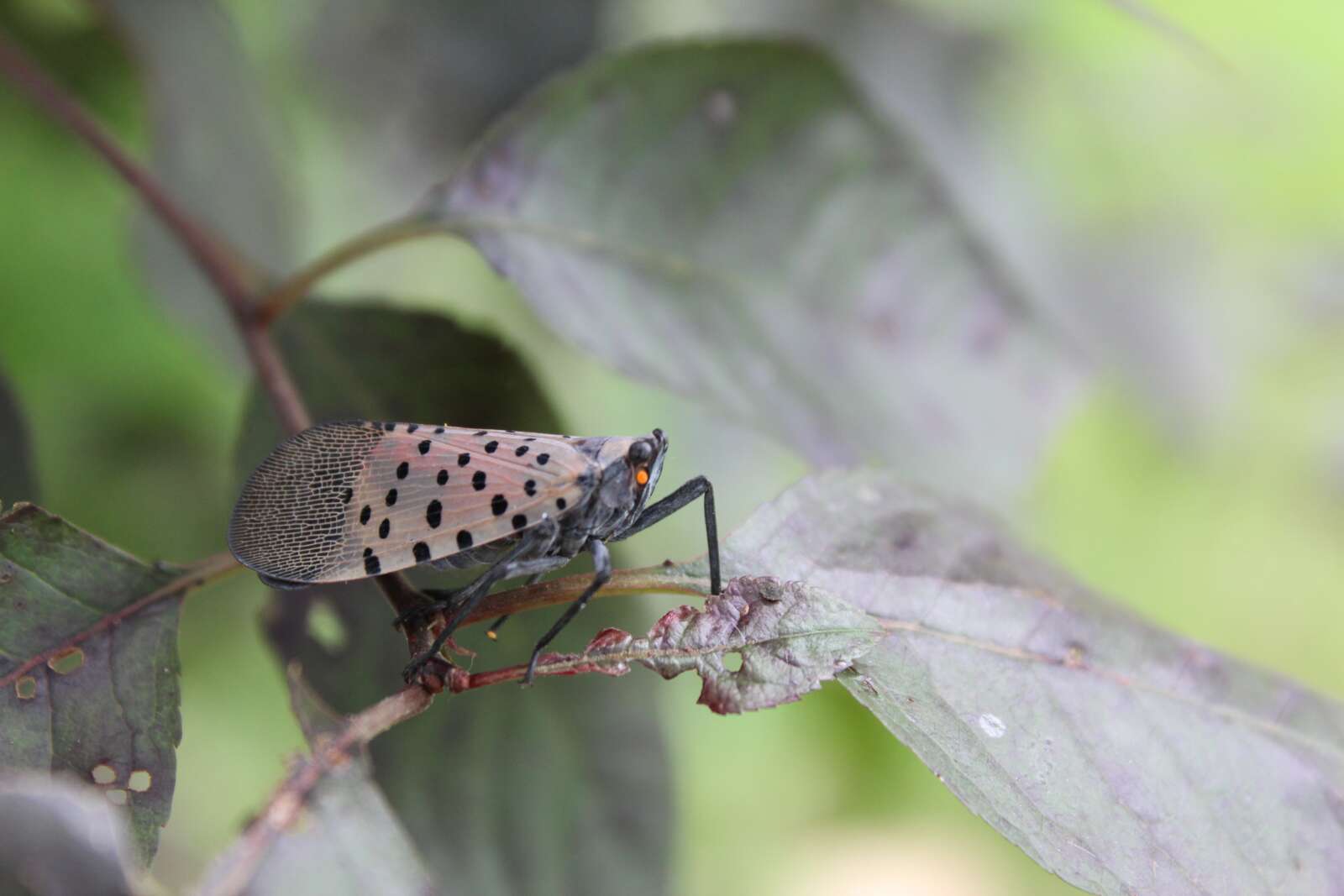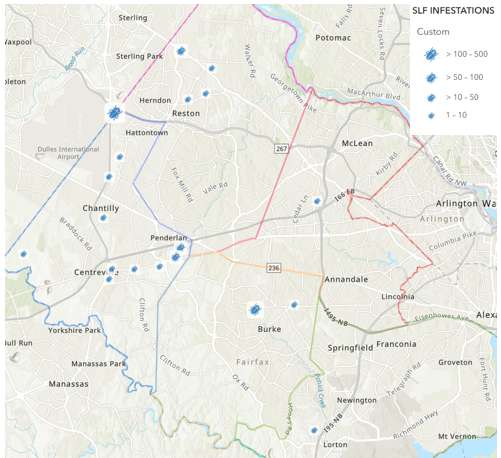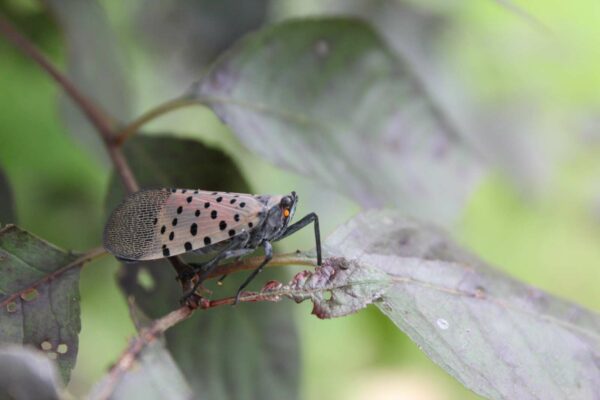
More reports of the spotted lanternfly are popping up throughout Fairfax County, according to local officials.
The invasive insect — which is native to China, India and Vietman — has been seen in more areas of the county, the Fairfax County Department of Public Works and Environmental Services says.
Officials are asking the public to help kill the pest. So far, the Maryland Department of Agriculture has been working closely with the county to determine how to reduce its numbers.
After first arriving in a grocery store shipment to Annandale, the bugs have primarily proliferated in the western area of the county, including Herndon, Centreville and Chantilly. Infestations have also been reported in Burke and Dunn Loring, according to a DPWES graphic.

The insects feasts on more than 70 plant species, particularly the invasive tree-of-heaven, and is particularly problematic for Virginia, where they’re threatening the peach, apple, grape and wine industries, DPWES says.
“Spotted lanternfly has the potential to cause severe nuisance to residents by feeding on trees, shrubs and herbaceous plants in unusually large numbers and leaving a sticky, smelly mess when they leave,” DPWES said. “While plant mortality is not a widespread concern, the nuisance created by these insects could cause some reactionary behaviors, leading to unnecessary pesticide use and the potential removal of valuable tree canopy and other vegetation.”
Egg masses are common in September and throughout the first few hard frosts. Vehicles help spread the pest around, particularly those near trees or the edges of a forest.
Here’s more from DPWES on how to help:
If you find spotted lanternfly, please report your findings through the mobile app iNaturalist or call 703-324-5304.
You can also report your findings by email at ReportSLF@fairfaxcounty.gov. Provide photos and an address with your report.
After careful identification, trap or kill the insect, and scrape and smash the egg mass.
Check your vehicles, trailers and mobile equipment (tractors, bobcats, etc.) before visiting other locations.
Photo via Magi Kern/Unsplash

Look Out for Spotted Lanternfly — “While there are still no sightings of the spotted lanternfly in Fairfax County, it is getting closer, and experts are on the lookout for it. This summer the invasive pest was found in nearby Loudoun County…The insect feasts on more than 70 plant species, though its preferred host is the tree-of-heaven.” [DPWES]
FCPD Detective Destroyed Evidence of Rape — Fairfax County police are reviewing dozens of unsolved sexual assault cases after the victim of a rape in 1995 learned that a detective had destroyed all physical evidence in her case, including the rape kit. Police now say they believe the woman’s account and that her case was handled inappropriately, but she says the department needs “to somehow be held accountable.” [The Washington Post]
Longtime Fairfax Symphony Leader Dies — “William Hudson, a pianist and conductor who led the Fairfax Symphony Orchestra for 36 years, establishing it as a leading regional orchestra in the capital area, died July 12 at his home in Vienna, Va. He was 89. The cause was atherosclerotic cardiovascular disease, said his former wife, Denise Battistone.” [The Washington Post]
Tysons Corner Center Owner Reports Retail Resurgence — “Macerich…noted that distress in the retail industry has slowed dramatically after a pandemic-spurred wave of closures in 2020…Macerich said its leasing activity in the second quarter reflected retailer demand at levels not seen since 2015.” [CNBC]
Vienna Police Share Results of Increased Traffic Enforcement — “After a noticeable increase in stop sign violations, the Town of Vienna Police Department had a directed enforcement initiative during the month of June…During the Stop Sign Enforcement Campaign, officers worked a total of 469 events utilizing stationary observation of stop signs, which generated 219 stop sign violations and 74 other violations.” [Vienna Police]
Local Meal Service Company Gets New HQ — MightyMeals, an overnight meal delivery company that grew out of a Franconia restaurant in 2015, has leased a 16,000-square-foot commercial unit at 7669 Limestone Drive in Gainesville for its new corporate headquarters. The space is seven times larger than its current 2,400-square-foot cooking prep warehouse in Burke. [Washington Business Journal]
Signs for Renamed Vienna Street in Place — “Vienna officials have replaced street signs on the former Wade Hampton Drive with new ones reading ‘Liberty Lane.’ The switch was done in early July ‘with little fanfare’ (as requested by residents), town officials said in the government’s monthly newsletter.” [Sun Gazette]
Bus Planned to Upcoming Innovation Center Metro — “OmniRide is hoping to take advantage of the forthcoming 66 Outside the Beltway toll lanes, and for the first time, its passengers could be getting one-seat trips to the Dulles area by the end of the year. The transit provider is hoping to start a commuter route that would take riders from Balls Ford Road to the Innovation Center Silver Line Metro stop in December” [Inside NoVA/WTOP]
It’s Wednesday — Humid throughout the day. High of 90 and low of 71. Sunrise at 6:13 am and sunset at 8:19 pm. [Weather.gov]

Fairfax County officials have a simple message for anyone who spots a spotted lanternfly: kill it immediately.
Native to China, the invasive insect can spread far and wide through its egg masses, making its way to Fairfax County via a recent shipment to a grocery store in Annandale. Loudoun County has also confirmed multiple sightings, but its presence has not reached the level of an infestation — yet.
“This is a relatively new pest in the area and the county is concerned about the potential impact this pest may pose,” Joan Allen, chief of the county’s forest pest management branch, told FFXnow.
Allen says that while the county has not found evidence of an infestation, the county has received several reports of a hitchhiker spotted lanternfly.
The insect can cause serious damage to home and commercial gardens, according to county officials. It thrives on more than 70 plant species, including grapes, apples, stone fruits, and tree-of-heaven. Officials say the state’s peach, apple, grape, and wine industries are most threatened by the insect.
The spotted lanternfly releases a sticky substance called honeydew that attracts wasps and ants. This substance can also encourage mold to grow on plants and trees, which can cover leaves, stunt plant growth, and ruin crops.
Although the insect has been in Virginia since 2018, its recent emergence has prompted the city of Winchester and Frederick, Clarke, and Warren counties to institute a spotted lanternfly quarantine. This effort is intended to slow its spread to un-infested areas of the state.
Businesses must receive a state permit and inspect articles to ensure that they do not contain any life stage of the spotted lanternfly, according to Fairfax County. This quarantine has been in effect since May 2019.
The insect has different colors during four different nymph stages. The county offers the following description of the insect’s changing appearance.
There are black and white nymphs; red, black and white nymphs; and adults. Adult lanternflies have gray-brown forewings, a black head and black spots. When at rest the hind wings, which are crimson in color, can be partially seen through the semi-translucent forewings, which gives the lanternfly a reddish cast. The lanternfly’s abdomen is yellow with black and white bands on the tip and bottom.
October is egg-laying season for most of the insects. Egg masses are typically covered with a light gray wax that looks like mud when it dries.
From this month through July, the county encourages residents to scrape egg masses from trees and trunks with adhesive bands. Scrapings should be discarded in containers of rubbing alcohol or hand sanitizer. Stump treatments, hack and squirt treatments, foliar sprays, and basal bark sprays can help during the other parts of the year.
For now, any spotted lanternfly should be killed immediately.
The first spotted lanternflies in the United States were found in Pennsylvania in 2014, according to the National Capital Partnership for Regional Invasive Species Management.
Four years later, Virginia officials documented the state’s first lanternflies infestation in Winchester. A quarantine was enacted by the Virginia Department of Agriculture and Consumer Services to slow the spread of the infestation.
Photo via Magi Kern/Unsplash

